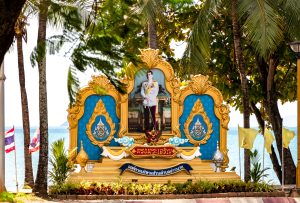A Thai court has issued an arrest warrant for a prominent American academic on charges of insulting the monarchy, a crime that carries a punishment of up to 15 years in prison.
Paul Chambers, a lecturer in political science at Naresuan University in Phitsanulok, a city in northern Thailand, told the Associated Press that police came to his workplace on Friday morning to serve him with an arrest warrant. He has been summoned to the local police station to formally hear the charges on April 8, and is hoping to secure his release on bail.
“I’m basically in limbo because I can’t go anywhere. I’m not supposed to,” he told the news agency. “I don’t know what’s going to happen, but I’m kind of nervous.”
According to the police summons, the warrant was approved by the Phitsanulok Provincial Court on March 31, after the regional army command filed charges against Chambers, accusing him of violating Article 112 of its Penal Code, which criminalizes critical comments about the country’s monarchy, and the Computer Crime Act.
Chambers, who has lived in Thailand for many years and is fluent in both Thai and Lao, is a recognized expert on the country and has written extensively on a range of topics, in particular, the role of the Royal Thai Army in Thailand’s political economy. His most recent book, ‘Praetorian Kingdom: A History of Military Ascendancy in Thailand,’ was published by the ISEAS-Yusof Ishak Institute last September.
The summons did not mention exactly what Chambers has been accused of, though the academic said that he believed it was related to a webinar last October in which he discussed the influence of the military in Thai politics. However, Article 112 prosecutions have been initiated in some cases over comically minor transgressions, from affixing a sticker to a portrait of the king and selling calendars featuring cartoon images of a duck, a symbol of the country’s pro-democracy movement, and publishing social media posts deemed critical of the royal institution.
Even advocating the repeal or reform of Article 112, which has emerged as a core demand of many Thai democrats, has been routinely viewed by Thai courts as a violation of Article 112. Last August, the Constitutional Court ordered the dissolution of the progressive Move Forward Party, which came in third at the general election of 2023, because it advocated the reform of the law, which it claims has been abused to shut down public debate about Thailand’s concentrations of wealth and power.
However, while the lese-majeste law has been used with abandon since the student-led protest movement of 2020-2021 – at least 274 people are facing lese-majeste charges, according to the advocacy group Thai Lawyers for Human Rights – it is rarely used against foreigners. Whether a lese-majeste case proceeds depends on a particular transgression being noticed, and a complaint being filed to the relevant authorities. There are hosts of royalist “petitioners” who specialize in sniffing out breaches of lese-majeste and reporting them to the authorities, but these zealots are much more likely to target their domestic political enemies than foreign researchers. Often, too, comments that would attract Article 112 scrutiny if made in Thai elude notice if made in English.
As journalist Pravit Rojanaphruk put it in an article for Khaosod English, Chambers is “an expert on this draconian royal defamation law, and has been treading carefully over the decades when discussing the matter and the monarchy institution.” “It’s fair to say he knows what he was doing, just like snake charmers know how dangerous cobras can be,” he added.
Given his long career of publishing critical scholarship on the Thai military, it is possible that local army commanders have been waiting for the opportunity to charge Chambers with breaches of Article 112. However, it is just as likely that Chambers is simply a victim of bad luck.

































